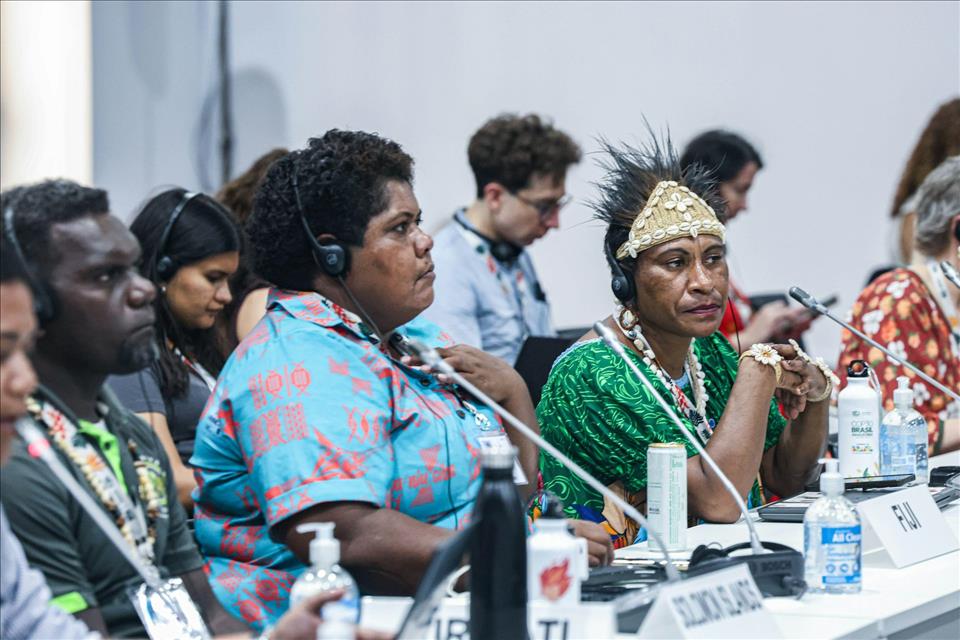
Why Small Climate-Vulnerable Island States Punch Well Above Their Weight In UN Climate Talks
Founded in 1990, Aosis represents 39 small island and low-lying coastal states. Its members are among the most vulnerable to rising seas and extreme weather, yet together they have become the moral voice of global climate diplomacy.
The now familiar 1.5°C limit of global warming was far from guaranteed when countries gathered in Paris in 2015. Many expected the summit to be less ambitious and settle for a 2°C target – at best.
But Aosis had been working behind the scenes since a disappointing climate summit in Copenhagen in 2009, pushing for a scientific review of the costs and benefits of a 1.5°C target. That review, published in 2015, proved vital in securing the inclusion of 1.5°C in the Paris agreement.“One-point-five to stay alive” became the rallying cry of the small island nations: and it was having an impact.
How Aosis worksAosis is a negotiating group rather than a formal organisation. It works through consensus and cooperation among its members, who vary widely but all share high vulnerablity to climate change.
The 39 member states (blue dots) are scattered across the Caribbean, Pacific, Africa, Indian Ocean and South China Sea. Aosis
Its work is spread between the chair's team and member states' permanent representatives at the UN, as well as heads of state and ministers. The role of chair rotates through the New York-based representatives, with Ilana Seid from the Pacific island nation of Palau currently serving.
Members meet frequently to develop joint positions ahead of major summits, pooling technical expertise and diplomatic resources that would otherwise be out of reach for many small states. While consensus building comes with compromise, the alliance ensures even the smallest states can consistently and actively engage in international diplomacy.
Past winsAosis has been influential from the very outset of the UN's climate process. At the 1992 Rio Earth Summit (which paved the way for Paris), it arrived with 12 key objectives and walked away having achieved ten, including a specific article in the UN's climate convention acknowledging that small island and low lying coastal states are particularly at risk.
Since then, Aosis has secured designated seats on key climate bodies, including the UN bureau that supports the summits, and boards of the Green Climate Fund, Adaptation Fund and Clean Development Mechanism.
The aftermath of Cyclone Winston in 2016. Winston was the strongest storm ever recorded in the southern hemisphere and tore through several small island states, including Fiji (pictured), Vanuatu and Tonga. ZUMA / Alamy
The group also played a significant role in establishing the loss and damage fund in 2022, to help vulnerable countries recover from climate-related disasters. Aosis had first proposed funding for loss and damage back in 1991.
From island diplomacy to global courtsThe influence of small island nations now extends into international law. A few years ago, Vanuatu, an Aosis member of only 300,000 people, led a campaign for the International Court of Justice (ICJ) to issue an advisory opinion on states' obligations to tackle climate change.
The ICJ's ruling, issued earlier this year, confirmed that states have legal duties to reduce emissions and protect people from climate change. This affirmed a principle Aosis had long argued for: the world's most polluting nations have not just a moral duty to act, but legal obligations to fellow states and their citizens.
As Margaretha Wewerinke-Sing, part of Vanuatu's legal team, put it:“The law seems to be catching up with the science. The question is now, will the policy catch up with the law?”
The agenda for Cop30The annual UN climate summit currently taking place in Belém, Brazil – Cop30 – is the first since the ICJ advisory opinion. It should give some initial insight as to how Aosis plans to use this ruling.
First, it is seeking greater commitments to reduce emissions. Under the Paris agreement, countries were due to submit revised climate plans this year, but only 86 have been submitted, out of 197. Of the 64 fully analysed so far, less than a quarter are in line with the Paris agreement's temperature goals. Aosis will use the ICJ opinion to stress that stronger targets are not just necessary but legally required.
Second, adaptation to climate change is becoming increasingly critical for island nations already living with rising seas and stronger storms. Aosis is calling for clearer targets and better tracking of adaptation finance under the Global Goal on Adaptation.
Third, Aosis wants developed countries to triple the volume of public climate finance by 2035 and leverage further funds to meet the US$1.3 trillion (£1 trillion) target under the“Baku to Belém Roadmap”. Without predictable finance, small islands cannot plan for the future.
Aosis made clear its stance ahead of this summit:“[we] will not join in a consensus at Cop30 that makes us co-signatories to our own destruction”. But as with the previous 29 Cops, long days and multiple agenda items mean small island delegations will be stretched thinly. The benefits of collaboration are therefore crystal clear.

Legal Disclaimer:
MENAFN provides the
information “as is” without warranty of any kind. We do not accept
any responsibility or liability for the accuracy, content, images,
videos, licenses, completeness, legality, or reliability of the information
contained in this article. If you have any complaints or copyright
issues related to this article, kindly contact the provider above.


















Comments
No comment